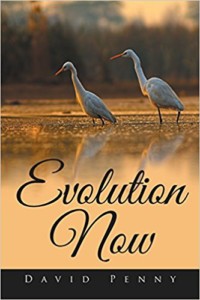Title: Evolution Now
Author: David Penny
Publisher: XlibrisNZ
ISBN: 9781499099294
Pages: 226
Genre: Science
Reviewed by: Susan Milam
Pacific Book Review
Evolution Now, by David Penny, could easily be subtitled, The Evolution of Evolution. In an accessible yet scholarly style, Mr. Penny considers the journey to modern evolutionary theory through a Popperian lens. While thinking there is still much to be discovered, Mr. Penny comes to optimistic conclusions about what the future holds.
During Mr. Penny’s years as a student in Christchurch, New Zealand, he was lucky enough to be taking a class in the philosophy of science concurrently with his purely scientific classes. As a result, he recognized the “Popperian” bent his science professors sprinkled into their lectures. A native of Austria, Sir Karl Popper spend several years teaching philosophy at Christchurch (prior to Mr. Penny’s student days) before moving on to the London School of Economics. As relayed by Mr. Penny, Sir Karl taught that “we can make good progress, but we should never (ever) ‘believe’ our current ideas.” Instead, scientific principles must be continually and thoroughly tested against themselves and against new scientific thought. Proceeding in a Popperian vein, Mr. Penny explores the progress made in theories of evolution, the questions to be addressed in the future and possible errors, past and present. Evolution Now briefly considers the earliest suppositions about how life evolves, and then dives into the changing thinking about spontaneous generation that begins in the 1600s. From there, Mr. Penny follows the circuitous path to Charles Darwin and the developments since that time, both Darwinian and non-Darwinian. The book’s latter chapters discuss genetics, Africa as the possible birthplace of modern man and the direction future thought on evolution.
Although the author uses a friendly voice, often making amused and amusing parenthetical comments, Evolution Now is grounded solidly in scientific modality. Mr. Penny’s Popperian point of view dictates that every hypothesis be subjected to rigorous scrutiny. The result is a lively, engaging book that challenges readers to think about accepted concepts in a new way. After finishing the book, readers may find themselves applying Popperian philosophy to their other reading material, and perhaps even other areas of their lives. Despite obvious disagreements with some of the ideas presented, Mr. Penny reminds readers that the ideas must be judged with considerations given to the times that produced them. In addition, he puts all the theories to the same exacting standards. Thus, the book maintains an objective tone that doesn’t condescend to earlier lines of thought. Throughout the text and when looking to the future, Mr. Penny keeps a positive, upbeat attitude that sets Evolution Now apart from many books examining evolutionary theories.
Evolution Now is not for the casual reader. The book explores four hundred years of scientific thinking on evolution in highly researched detail. However, Mr. Penny discusses the concepts in an organized and accessible manner, and the chapters build on the information found in the previous chapters. Thus, readers with a desire and a willingness to delve deeply into the subject will be richly rewarded by Evolution Now.


